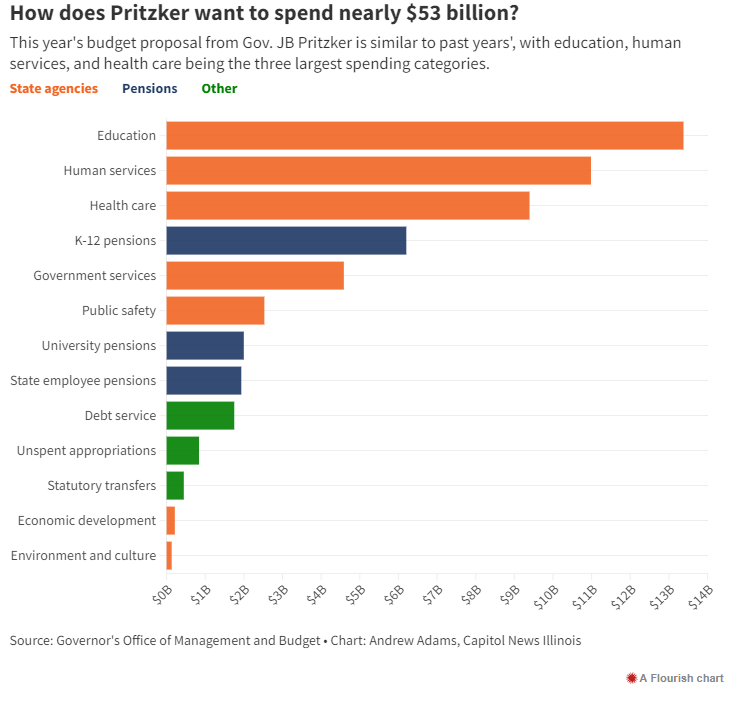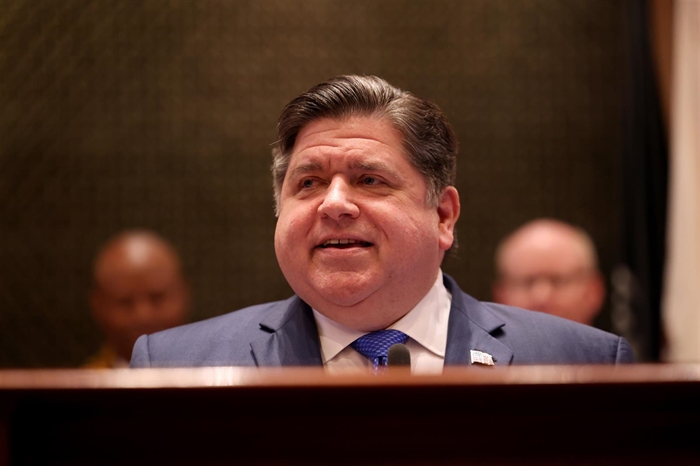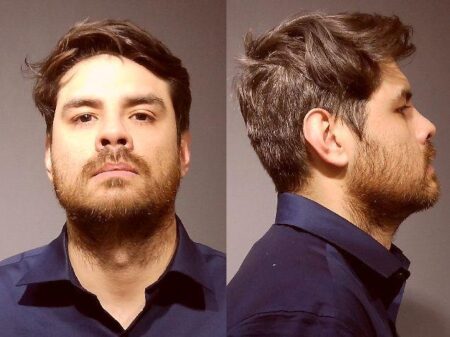By HANNAH MEISEL
Capitol News Illinois
In delivering his annual State of the State and budget address on Wednesday, Gov. JB Pritzker cast his administration as both progressive and pragmatic – a balance he’s worked to strike as his national profile has grown.
Some elements of the governor’s proposed spending plan, like using $10 million in state funds to eliminate $1 billion worth of Illinoisans’ medical debt, are hardline progressive ideas. Others, including a goal to achieve “universal preschool” by 2027, fit in with a more traditional liberal platform.
But Pritzker has also defined his success in traditional economic terms, putting particular stock into how New York City-based credit ratings agencies view Illinois’ finances, while also positioning Illinois as a hub for emerging technologies like electric vehicles and quantum computing.
As Illinois faces an influx of migrants from the southern U.S. border Pritzker has leaned into a leadership style that prioritizes progressive ideals while projecting an image of fiscal responsibility.
“We didn’t ask for this manufactured crisis,” Pritzker said Wednesday in making good on his promise to propose another $182 million toward the state’s migrant response. “But we must deal with it all the same.”
Both approaches were on display during his hourlong speech Wednesday as he blasted Republican Texas Gov. Greg Abbott, who has so far sent about 35,000 migrants to Chicago since his administration began bussing asylum-seekers in 2022. He also blasted former President Donald Trump while again criticizing President Joe Biden for not providing a more coordinated migrant response.
“Children, pregnant women, and the elderly have been sent here in the dead of night, left far from our designated welcome centers, in freezing temperatures, wearing flip flops and T-shirts,” Pritzker said. “Think about that the next time a politician from Texas wants to lecture you about being a good Christian.”
Progressive proposals
The governor was met with big applause from Democrats in laying out his proposed “Healthcare Consumer Access and Protection Act,” which would, in part, ban “prior authorization” requirements for mental health treatment.
Pritzker characterized the practice of prior authorization as a way for insurance companies to deny the care that doctors have prescribed.

Additionally, the governor’s plan would ban the sale of limited duration health coverage plans in Illinois – the sort of plans, Pritzker said, that often don’t comport to the most basic coverage requirements in the Affordable Care Act, like pre-existing conditions. Twelve other states have banned what the governor called “junk insurance.”
“Now I know how hard the insurance industry will fight me on this. But let me be perfectly clear: I am willing to spend serious political capital and put my shoulder to the wheel to get this done,” he said, after telling the story of a state employee whose insurance denied coverage for open heart surgery.
Pritzker is also proposing spending $10 million in state funds to buy Illinoisans’ past-due medical debt that’s been sent to collections. Partnering with national nonprofit RIP Medical Debt, which buys debt for pennies on the dollar on the same market that collections agencies purchase the rights to the debts, the governor said Illinois could “relieve nearly $1 billion in medical debt for the first cohort of 340,000 Illinoisans.”
The governor spent time noting two key places he said Illinois fails its Black citizens: maternal mortality and disproportionate rates of homelessness.
To combat Black maternal mortality rates, Pritzker proposed helping more community-based reproductive health centers to open, citing Illinois’ first freestanding nonprofit birthing center in Berwyn as a model.
“Black women in our state are three times more likely to die from pregnancy-related causes than white women,” he said.
Pritzker proposed spending an additional $50 million on the state’s “Home Illinois” program launched in 2021, in part to “attack the root causes of housing insecurity for Black Illinoisans.” He cited a statistic that Black people make up 61 percent of Illinois’ homeless population despite only being 14 percent of the state’s general population.
Additionally, the governor proposed a $1 million pilot program for free diapers for low-income families as well as a $5 million increased investment in an existing home visit program “for our most vulnerable families” with babies in their first year.
His budget also includes $12 million to create a child tax credit for families with children under three with incomes below a certain threshold. Though that proposal received applause during the speech, the funding is far below the $300 million advocates have been pushing for in their own proposal for a child tax credit.
Among the successes Pritzker pointed to on Wednesday, perhaps the most salient is his claim that Illinois’ new “Smart Start” early childhood program – proposed last year in the governor’s second inaugural address – had exceeded its first-year goals.
The program aimed to create 5,000 new preschool seats last year, but ended up creating 5,823, Pritzker said – a 15 percent overperformance.
“As a result, right now we have over 82,000 publicly-funded preschool classroom seats – the highest number in our state’s history,” Pritzker said. “Staying on the Smart Start plan, we will achieve universal preschool by 2027.”
Echoing his 2022 election-year call for a temporary pause on the state’s 1 percent tax on groceries, Pritzker on Wednesday proposed nixing the grocery tax altogether.
“It’s one more regressive tax we just don’t need,” he said. “If it reduces inflation for families from 4 percent to 3 percent, even if it only puts a few hundred bucks back in families’ pockets, it’s the right thing to do.”
But local governments, which receive that grocery tax money, were sharply critical of the plan.











